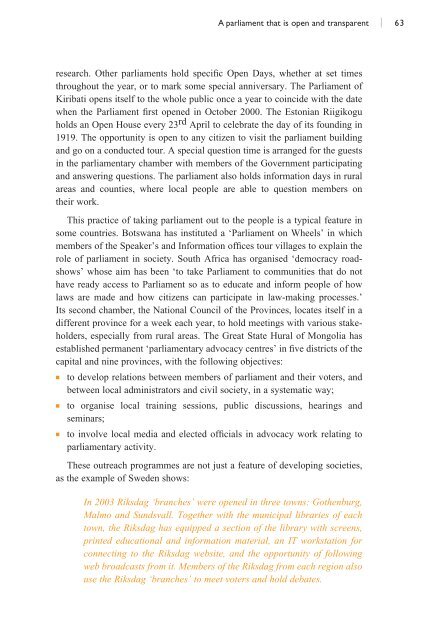PARLIAMENT AND DEMOCRACY - Inter-Parliamentary Union
PARLIAMENT AND DEMOCRACY - Inter-Parliamentary Union
PARLIAMENT AND DEMOCRACY - Inter-Parliamentary Union
Create successful ePaper yourself
Turn your PDF publications into a flip-book with our unique Google optimized e-Paper software.
A parliament that is open and transparent I 63<br />
research. Other parliaments hold specific Open Days, whether at set times<br />
throughout the year, or to mark some special anniversary. The Parliament of<br />
Kiribati opens itself to the whole public once a year to coincide with the date<br />
when the Parliament first opened in October 2000. The Estonian Riigikogu<br />
holds an Open House every 23 rd April to celebrate the day of its founding in<br />
1919. The opportunity is open to any citizen to visit the parliament building<br />
and go on a conducted tour. A special question time is arranged for the guests<br />
in the parliamentary chamber with members of the Government participating<br />
and answering questions. The parliament also holds information days in rural<br />
areas and counties, where local people are able to question members on<br />
their work.<br />
This practice of taking parliament out to the people is a typical feature in<br />
some countries. Botswana has instituted a ‘Parliament on Wheels’ in which<br />
members of the Speaker’s and Information offices tour villages to explain the<br />
role of parliament in society. South Africa has organised ‘democracy roadshows’<br />
whose aim has been ‘to take Parliament to communities that do not<br />
have ready access to Parliament so as to educate and inform people of how<br />
laws are made and how citizens can participate in law-making processes.’<br />
Its second chamber, the National Council of the Provinces, locates itself in a<br />
different province for a week each year, to hold meetings with various stakeholders,<br />
especially from rural areas. The Great State Hural of Mongolia has<br />
established permanent ‘parliamentary advocacy centres’ in five districts of the<br />
capital and nine provinces, with the following objectives:<br />
■ to develop relations between members of parliament and their voters, and<br />
between local administrators and civil society, in a systematic way;<br />
■ to organise local training sessions, public discussions, hearings and<br />
seminars;<br />
■ to involve local media and elected officials in advocacy work relating to<br />
parliamentary activity.<br />
These outreach programmes are not just a feature of developing societies,<br />
as the example of Sweden shows:<br />
In 2003 Riksdag ‘branches’ were opened in three towns: Gothenburg,<br />
Malmo and Sundsvall. Together with the municipal libraries of each<br />
town, the Riksdag has equipped a section of the library with screens,<br />
printed educational and information material, an IT workstation for<br />
connecting to the Riksdag website, and the opportunity of following<br />
web broadcasts from it. Members of the Riksdag from each region also<br />
use the Riksdag ‘branches’ to meet voters and hold debates.

















